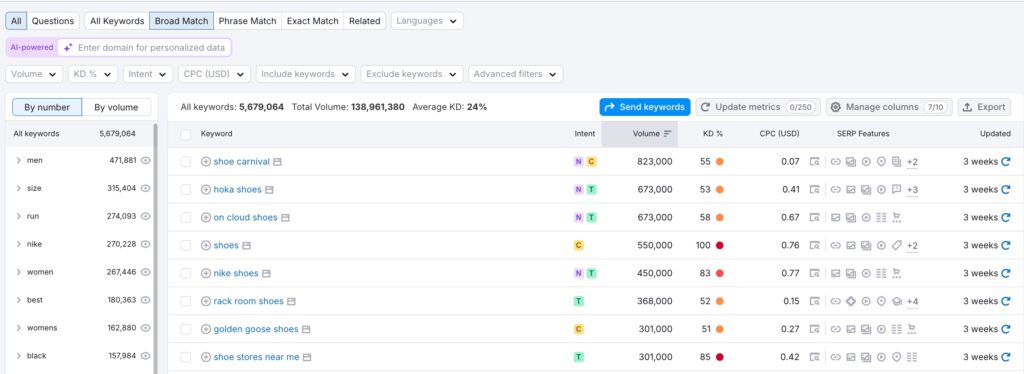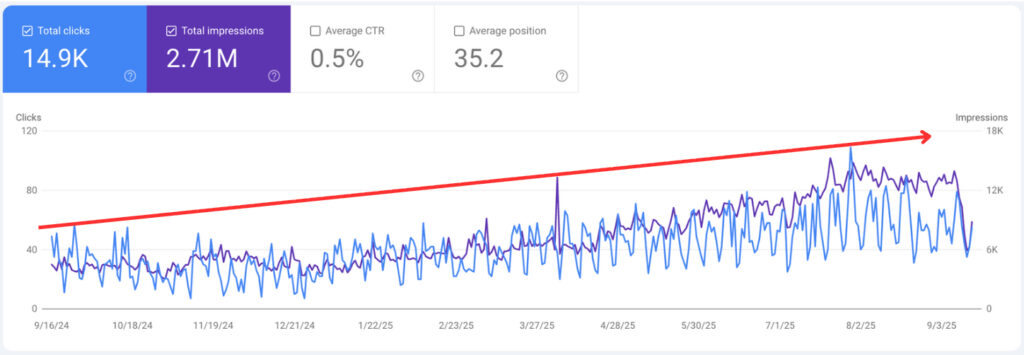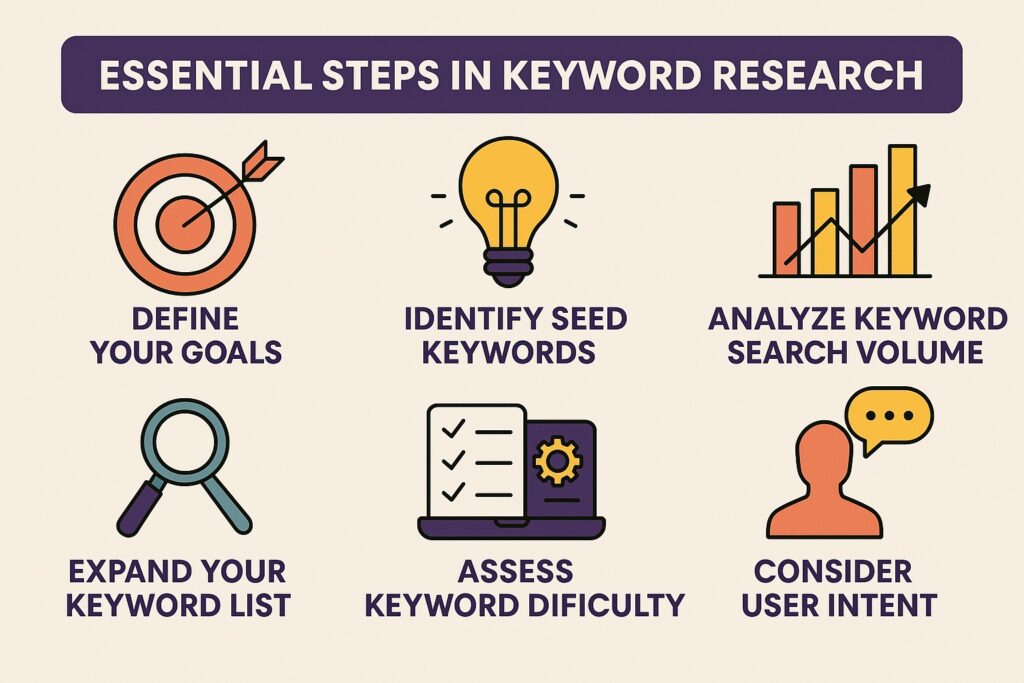In the dynamic world of search engine optimisation (SEO), understanding the foundation of successful content strategies begins with mastering keyword research. This process, essential for identifying and understanding the search terms people use online, is at the heart of our beginners guide to keyword research. By grasping these keywords, you can tailor your content to match the interests and queries of your target audience, driving organic traffic to your website and enhancing your overall SEO efforts. Whether you’re just starting out or looking to refine your skills, this guide is your first step towards SEO mastery.
Key Takeaways
- Keyword research helps your content get found by the right audience through search engines.
- Good keyword strategy starts with clear goals and understanding your customers’ intent.
- Long-tail keywords often offer better results than broad terms — especially for smaller or newer sites.
- Keyword tools like Google Keyword Planner, Ubersuggest, and Ahrefs help you find and validate keyword opportunities.
- Keyword research is never “done” — it evolves as your business and your audience grow.
What is keyword research?

Keyword research is the process of identifying and analysing the search terms that people use to find information online. It’s an essential part of search engine optimisation (SEO) because it helps you understand what your target audience is looking for and how you can create content that is relevant and valuable to them.
By doing keyword research, you can:
- Uncover the most popular search terms in your industry or niche.
- Identify long-tail keywords that are less competitive and more targeted.
- Get insights into your target audience’s interests and needs.
- Track the performance of your keywords over time.
Keyword research can be done using a variety of tools, both free and paid. Some popular options include Google Keyword Planner, Ahrefs, and Semrush.
Some of the benefits of doing keyword research
- Increased website traffic: By targeting relevant keywords, you can attract more visitors to your website from organic search results.
- Improved ranking: When your website is optimised for relevant keywords, it is more likely to appear higher in search engine results pages (SERPs).
- Better conversion rates: By creating content that is relevant to your target audience, you can increase the likelihood that visitors will take action on your website, such as signing up for a newsletter or making a purchase.
Why is keyword research important?

Unveiling the Hidden Potential of Keyword Research: Attracting Organic Traffic through Strategic Keyword Selection In the bustling realm of search engine optimisation (SEO), keyword research often takes centre stage, serving as the compass that guides content creation and drives organic traffic. While its importance is widely acknowledged, many website owners overlook the true power of keyword research, resulting in missed opportunities and stagnant website growth.
The Pitfall of Ignoring Keyword Research: A Tale of Unseen Content
Imagine crafting a masterpiece of content, an article brimming with insights and expertise, only to have it languish in the depths of the internet, unseen by the very audience it was meant to serve. This is the unfortunate reality for many websites that fail to prioritise keyword research. A study revealed that a staggering 90.63% of pages on the internet receive no organic traffic from Google, a stark reminder of the consequences of neglecting keyword research. These pages, despite their potential value, remain buried in obscurity, invisible to the sea of potential visitors searching for information.
Unleashing the Power of Keyword Research: A Gateway to Organic Traffic
Keyword research, when embraced strategically, acts as a gateway to organic traffic, transforming your website into a magnet for relevant visitors. By delving into the search terms that people use to find information, you gain invaluable insights into their interests, needs, and intentions. Armed with this knowledge, you can tailor your content to match the language and expectations of your target audience, ensuring that your articles and pages resonate with their search queries. This alignment is the key to unlocking organic traffic, drawing visitors to your website from the very depths of search engine results pages (SERPs).
The Rewards of Strategic Keyword Selection: A Consistent Stream of Targeted Visitors
When keyword research is conducted diligently and implemented effectively, the rewards are tangible. Your website, once hidden from view, emerges as a beacon of relevant information, attracting a consistent stream of highly targeted visitors. These visitors, drawn in by the promise of valuable content, are more likely to engage with your website, read your articles, and take desired actions, such as subscribing to newsletters or making purchases.
Keyword Research: An Investment in Your Website’s Success

Keyword research is not a mere formality; it is an investment in your website’s success. By dedicating the time and effort to understand the search landscape and select relevant keywords, you lay the foundation for a thriving online presence, one that attracts organic traffic, fosters engagement, and drives conversions. Embrace keyword research, not as a chore, but as an opportunity to connect with your target audience, share your expertise, and establish your website as a trusted authority in your field. The rewards will be evident in the form of a steady stream of visitors, engaged users, and a website that thrives in the dynamic world of search engine optimisation.
The Significance of Keyword Research
Keyword research is not just about finding high-volume keywords; it’s about uncovering the language and intent behind user searches. It allows you to:
- Understand User Intent: Keyword research reveals the motivations and goals behind user searches, enabling you to create content that directly addresses their needs and expectations.
- Target Relevant Audiences: By identifying relevant keywords, you can attract the right audience to your website, ensuring that your content resonates with those who are genuinely interested in your offerings.
- Improve Content Relevance: Keyword research guides you in crafting content that aligns with the search terms people use, increasing the likelihood that your content appears in relevant search results.
- Monitor Keyword Performance: Keyword research provides a framework for tracking the performance of your chosen keywords, allowing you to evaluate your SEO efforts and make data-driven decisions.
Essential Steps in Keyword Research

- Define Your Goals: Clearly define your objectives for keyword research, whether it’s increasing website traffic, generating leads, or boosting brand awareness.
- Identify Seed Keywords: Brainstorm broad keywords related to your website’s niche or industry. These seed keywords will serve as the starting point for your research.
- Expand Your Keyword List: Utilize keyword research tools to expand your seed keywords into a comprehensive list of relevant terms, including long-tail keywords and variations.
- Analyze Keyword Search Volume: Evaluate the search volume for each keyword to determine their popularity and potential impact.
- Assess Keyword Difficulty: Assess the competition for each keyword to gauge the effort required to rank for them.
- Consider User Intent: Understand the user intent behind each keyword to ensure your content aligns with their search goals.
Keyword Research Tools
Numerous keyword research tools are available to aid in your research journey. Some popular options include:
- Google Keyword Planner: A free tool from Google that provides keyword suggestions and search volume estimates.
- Ahrefs: A comprehensive SEO tool that offers in-depth keyword research capabilities, including competitor analysis and keyword ranking difficulty.
- Semrush: Another powerful SEO tool that provides keyword research features, along with site audits, rank tracking, and backlink analysis.
Keyword Research: An Ongoing Process
Keyword research is not a one-time task; it’s an ongoing process that requires continuous monitoring and adaptation. Search engine algorithms evolve, user preferences change, and new trends emerge. Regularly revisiting your keyword research ensures that your content remains relevant and aligned with the ever-changing landscape of online search.
Conclusion
Embracing the principles outlined in this beginners guide to keyword research is not just about improving your SEO; it’s about connecting with your audience on a deeper level. By continuously applying these strategies, you’ll not only attract the right audience but also establish your brand as a trusted authority in your field. Remember, keyword research is an ongoing journey of discovery and optimisation. Keep refining your approach, and watch as your efforts lead to a thriving online presence and SEO success.
FAQs:
Start with Brainstorming: Begin by brainstorming a list of topics relevant to your business or niche. Think about the questions your audience might have or the problems they’re trying to solve.
Use Keyword Research Tools: Utilize tools like Google Keyword Planner, Ahrefs, SEMrush, or Ubersuggest to generate keyword ideas based on your initial topics.
Analyze Search Intent: For each keyword, understand the search intent behind it. Is the user looking to buy, to learn, or to find a specific website?
Evaluate Keyword Difficulty and Search Volume: Use your keyword tool to assess how hard it would be to rank for each keyword (keyword difficulty) and how many searches it gets per month (search volume).
Select Your Keywords: Choose keywords that have a good balance of search volume and difficulty, and align with your content goals and search intent.
Begin your keyword research with a clear understanding of your audience and their needs. Start by brainstorming topics that are relevant to your audience and your business. These topics will guide you in finding specific keywords that potential customers might use to find your content.
There’s no fixed number of keywords you should use for SEO. However, it’s crucial to focus on a primary keyword for each piece of content and include a few related secondary keywords. The key is to ensure natural integration of these keywords into high-quality, valuable content without overstuffing.
While there’s no strict word count for SEO success, 500 words can be sufficient for some topics, especially if the content is high-quality, relevant, and answers the user’s query effectively. However, longer content often ranks better because it provides more comprehensive information.
A focus keyword is the primary keyword that you want your webpage or article to rank for in search engines. It’s the most important keyword that reflects the main topic of your content and is strategically placed in titles, headings, and throughout the content.
A long tail keyword is a longer and more specific keyword phrase, usually three or more words. It’s often less competitive than shorter, more generic keywords and targets more specific search intents, making it easier to rank for and attract qualified traffic.




